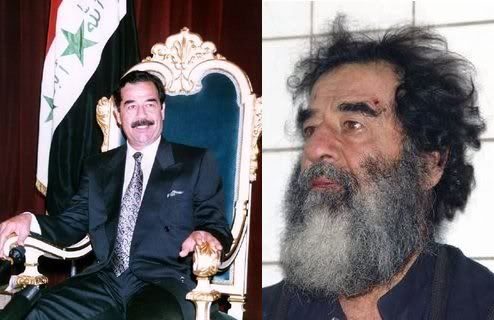Source
“If they come, we are ready. We will fight them on the streets, from the rooftops, from house to house. We will never surrender”
Saddam Hussein, August 2002.
 The quote above is taken from a speech made to the Iraqi people before the 2003 invasion of Iraq, and just under a year before Saddam left “his people” and was discovered in a ditch.
The quote above is taken from a speech made to the Iraqi people before the 2003 invasion of Iraq, and just under a year before Saddam left “his people” and was discovered in a ditch.People today tend to know very little about Saddam Hussein as a man and know him only as “the undisputed master of Iraq”, a vicious and heartless dictator.
The man who was going to be one of the most powerful Arab leaders of modern times came from an impoverished village on the banks of the Tigris River on the outskirts of Tikrit. Saddam Hussein was born to a town Whore (and Clairvoyant) Subha Tulfa, and his father Hussein Al-Majid whose fate remains unknown, and has been described in many references as “just one of Saddam’s mothers Clients”.He was orphaned before he reached his teen years and was sent to live with relatives. Saddam lived in a village known as “Al- Ouja” which directly translates as “the turning” and was simply a collection of mud huts on the banks where Tigris River made a sharp turning. The people there lived in conditions of abject poverty. The relatives Saddam was sent to live with was his Uncles family (Subha’s brother).
Khairallah Tulfa, Saddams uncle, was an Arab Nationalist and was the closest thing Saddam had to a father. He was an unapologetic supporter of Adolf Hitler and Nazi ethos. Khairallah raised Saddam with a deep hatred for the Iraqi royal family, all of the foreign bankers (the British) and strict “xenophobic” ideals. Saddam in later life described his uncle to many in an idealistic “Hero” image. One doesn’t need a profound knowledge of Psychology to know the effects of such an upbringing on a child. Like Hitler and Stalin, the two tyrants of the 20th century, both of whom overcame their less than auspicious upbringings to take absolute control of their respective nations, Saddam was to rise above the disadvantages of his childhood and become “the Undisputed leader of Iraq”.
As with any other dictator, Saddam had a fearless appearance and cast a nature fear amongst his people. I have never supported Saddam Hussein, and by starting my editorial with information on his childhood I don’t aim to justify his actions nor defend them. I like plenty of other Iraqi’s lived to see the reality of a totalitarian dictatorial ruling, and will never support such a thing. However, plenty of people have asked me the same question over and over again, that being:
“Regardless of the legality of the invasion of Iraq by America, would you prefer Iraq under an Evil Saddam or Iraq as it is today?”
My answer is always the same: Iraq under Saddam.
I find the question itself to be a very foolish question actually. No person in their right mind would choose a dictator over freedom, however at the same time no person would choose instability over stability.
When Saddam ruled, it might have been a dictatorship and he may have carried out atrocities, but the overall status in the country was a secure status.
I don’t choose a dictator, but I choose that status of the country under the dictator, as opposed to the status of the country today under the alleged democratic ruling.
Under Saddam’s ruling order was kept, and you could walk in the streets of Iraq and feel safe. Today you can’t walk the streets of Iraq and feel safe, today there is no such thing as “safety” in Iraq. Today rebels rule the streets of Iraq and religion has been taken to unseen levels.
Boys have been brainwashed by foolish uneducated old men who have extremist views of religion, and these boys go on to be the suicide bombers killing plenty of innocents in the name of a God. The country has become divided by religious sects, creating a weak unstable society with no promise for a united and stable future.
None living in a “civilised” country can contemplate the status of Iraq, but I assure you it is no where near as good as the state as it was before the 2003 invasion, and definitely not better than it was then.
What exists in Iraq today is far from the intended democracy, and the people that were meant to be “liberated” are far from that. People seem to forget that a Democracy is formed “by the people” and that any form of a revolution has to be carried out by the people themselves and not by external interference.
On the day that Saddam was captured, when I and my family were made aware of the circumstances of the capture and where he was found, the happiness that was immediately felt amongst us all, as I can imagine was felt amongst the majority of Iraqi’s was indescribable.
To see a man who once ruled with such confidence, who was the cause of everyone’s fear, pulled out of a ditch like the rat he is, is something no Iraqi could have contemplated during his leadership. The transformation of his appearance was shocking, a man who once looked in perfect health and strength, looked no better than a street tramp.

On the day of his execution, the final words that were spoken between Saddam and his executioners are said to be:
[Saddam] God is Great. Palestine is Arab
[Voices] May God's blessings be upon Muhammad and his household.
[Voices] And may God hasten their appearance and curse their enemies.
[Voices] Muqtada [Al-Sadr]...Muqtada...Muqtada.
[Saddam] Muqtuda? (laughs) Are you men? Is this the bravery of Arabs?
[Voice] Long live Muhammad Baqir al-Sadr.
[Voice] To hell.
[Saddam] The hell that is Iraq?
[Voice] You have destroyed us, killed all of us, our nation is ruined.
[Saddam] I helped you survive. Iraq is nothing without me!
[Voice] Please do not. The man is being executed. Please no, I beg you to stop.
[Saddam] There is no God but Allah and I testify that Muhammad is the messenger of God. There is no God but Allah and I testify that Muhammad...
Much as Saddam was evil and much as he was a fool, his final words are only words of truth. The leaders of Iraq are far from men and what has become of the Arabs who started civilization, is atrocious. What remains of Iraq is in effect hell.
So I write this editorial today 1 year after the execution of the man who treated Iraqi’s much like Hitler treated the Jews, who was the cause millions of deaths, who was backed by America and rose with their support, and who was later brought to his fall by America.
I write it not in his memory, but in the memory of a country that was and a country that will never again be.
